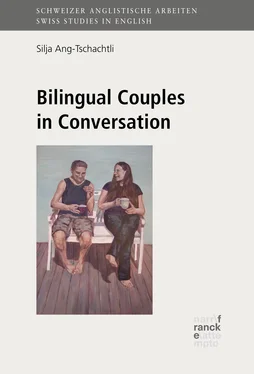At some point in their relationship, however, the couples were confronted with a new situation, as the English-speaking partners decided to move to Switzerland permanently (with the exception of Tim E, who was only staying in Switzerland temporarily at the time of the interview). Thus, the community languagecommunity language changed, and, as a consequence, the German skills of the Anglophone partners improved. A number of them have even become fluent in German, although, according to their reports, they have not quite reached the level of skills that the Swiss partners have attained in their L2 (again, Joshua Eis the exception to this). The difference in language skills may partially account for (but may also be a result of) the fact that most of the couples adhered to English as their primary couple language. Moreover, the Swiss partners might have felt more confident and comfortable using their L2 than the English speakers, due to the formers’ formal education combined with their exposure to English in a natural environmentenvironmentnatural. It has been suggested that a combination of natural and instructed learning tends to result in a comparatively strong sense of L2 ownership (Piller 2002a: 99), which may have been the case for the Swiss partners in this study.
Indeed, a number of participants name insufficient language skills in (Swiss) German as a reason for still using English as their relationship language. As an example, David Estates that he and his wife speak English to each other almost exclusively because of his low proficiency in German:

The example shows that David explains his (reportedly) rather poor L2 skills with his lack of formal schooling in German. Before meeting Susanne, he had even attempted to learn the language, but unsuccessfully, which may explain his low motivationmotivation to speak it at present. Susanne implies that his level of motivation was not high enough because he had not yet met her at that point in his life. David speaks haltingly throughout his turn, using a lot of hesitation markershesitation marker ( uh 7 times, well 2 times), pauses, lengthening (“a:nd” [246]) as well as false starts (“I” [244]) (all underlined). This indicates that the subject of his limited language skills in German makes him feel uncomfortable or frustrated, and probably also, in turn, less interested in speaking the language. Responses from other interviewees suggest that a low level of proficiency in Swiss German may lead to frustration in both partners, for instance if they are not able to discuss complex subjects with each other, or if one of them feels that the other one gives up and reverts to English too quickly (see below).
Besides language proficiency, an important reason for the couples not having transitioned at least partially to the community language is that they were already accustomed to communicating in English when they took up residence in Switzerland. The participants’ answers underline the important role of habithabit, as many of them believe that they speak English to each other “cause it was English at the start” (Richard E253), and “because that’s what [they] […] always did” (Katia SG585–587). When the English-speaking partner migrated to Switzerland, most of the couples already regarded English as their relationship language and as an essential component of their couple identityidentitycouple. This also explains why many couples still find it difficult to switch to (Swiss) German even for a short period of time, although they would want to do so in order for the non-native speaker to improve his or her language skills. The following example illustrates this:


Dean and Monika enumerate several reasons why they rarely speak German to each other, although Dean states that he would, in theory, like to do so (500). The couple repeat three times that it is “hard” for them to speak (Swiss) German to each other (500, 509), and suggest that, because they are so accustomed to communicating in English, it requires a great deal of concentration for them to speak a different language to each other. More importantly, English is the language of their shared past, their language of intimacy, while German lacks this emotional quality. Monika says emphatically that this is especially the case for Standard German, which is not at all an intimate language for her (511). This highlights that the diglossic language situationdiglossia in Switzerland may keep the couples from shifting to the community language, as the non-native speakers initially learn Standard German, yet many Swiss do not view this as their mother tongue and might feel uncomfortable using Standard German as a language of intimacy (see section 2.3, “Diglossia and the ideology of dialect”).
Other couples report similar difficultieschallengeslinguistic in their attempts to switch to German, since both partners feel that this language does not allow them to establish an emotional or intellectual connection (Robert/Stephanie, Courtney/Martin, Sophia/Richard, Philipp/Karen). As an example, Stephanie SGand Robert Eoccasionally decide to speak German to each other in order for Robert to improve his language proficiency, but they often do not succeed in having an extended conversation, because they become increasingly frustrated with the lack of intimacy during their interactions:

Robert and Stephanie both struggle with the absence of an emotional connection and the inability to express feelings precisely, but also with the challenges of having an intellectual exchange in German.
The three examples above underline that the attitude and motivationmotivation of the partners also play a crucial role in their language choice. While many of the English speakers claim to be motivated to speak (Swiss) German in order to improve their language skills, they and their partners find it difficult to put their intentions into practice. Martin SGreports that he and his partner sometimes decide to speak German to each other for at least half an hour, but that it usually ends up being “five minutes, a few sentences” (171). In their case, Courtney’s Erather basic German skills cause Martin to revert to English in order to explain grammar rules to her. Others report similar problems with switching to German, which they fail to do even for a short period of time, despite their best efforts. Besides habit and proficiency, this failure to follow through with their intentions may partly be due to the fact that there is often no real necessity for the Anglophone partner to become proficient in (Swiss) German, and that the local varietyvarietyof Swiss Germandialectregional has little ideological or economic value outside of Switzerland (see chapter 2, “Language situation in Switzerland”).
Another relevant factor that causes the couples to continue communicating in English is that many of the Swiss partners have a high motivation and a personal interest in speaking English with their partners. Philipp SGsays that English seems an obvious choice as their couple language, since he and his wife got to know each other in the United States, and he “was there for … language purposes” (Philipp SG233). Simon SGalso states that he and Claire speak English to each other out of self-interest, as she prefers using her mother tongue at home, and he benefits from the frequent exposure to the language:
Читать дальше
















